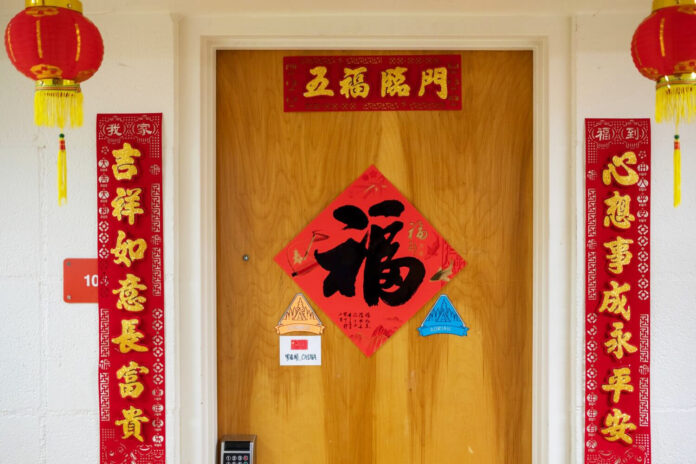
Communities across the world are celebrating the Lunar New Year holiday that officially began Feb 1. Among these celebrations will be a Lunar New Year festival organized by Occidental’s newly-formed Asian Pacific Islander Desi American Association (APIDAA) to ring in the Year of the Tiger. Student organizations have planned similar celebrations in the past, but this year’s event, which will be hosted in the Academic Quad Feb. 18, marks APIDAA’s first time planning it, according to a representative for the club Kaili Solverud (first year).
“I personally was pretty sad to hear about my family celebrating without me,” Solverud said. “Having a community for that here on campus is definitely really nice.”
The festival marks the unique collaboration of 10 different groups and organizations on campus: APIDAA, the Japanese Cultural Organization (JCO), the Korean American Student Association (KASA), the Chinese Students and Scholars Association (CSSA), Hawai’i Club, the Asian American Tutorial Project (AATP), the Asian Pacific Islander Desi American (APIDA) Themed Living Community (TLC), the student radio station KOXY, the Intercultural Community Center (ICC) and the Student Leadership, Involvement, and Community Engagement (SLICE) office.
A broad celebration of the new year, this year’s festival will have food, music and student performances. According to Solverud, a number of clubs will also be setting up informational booths at the event.
“The K-POP Dance Club is kind of like our headliner,” Solverud said. “We are currently planning on having a food truck, [with other] food and performances for people to enjoy. [To] be a bit more COVID-safe, people can just walk through and continue on. They can stop by the booths to get more information if they’d like, but there’s no obligation to come and sit down.”
According to Solverud, the club’s founding was motivated by a lack of representation felt among members of Occidental’s Asian Pacific Islander Desi American (APIDA) community.
“This past fall, I was disappointed when I attended [the Involvement Fair] and saw no cultural clubs that I fit into, especially after having the Taiwanese Student Association be a significant part of my high school life,” Solverud said. “I started asking around about it after, and Jasmine Mack informed me that a couple people that she knew were working on forming APIDAA and asked if I would be interested in helping with that.”
Through Mack, Solverud got in touch with the club’s president, Ashley Muranaka-Toolsie (junior), and vice president Erin Kim (junior).
APIDAA plans to provide better representation and solidarity among Occidental’s APIDA communities at a time when Asian Americans, both at the college and around the country, have felt particularly threatened, Muranaka-Toolsie said.
“Upon our return to campus in-person, there was a lack of unified community,” Muranaka-Toolsie said via email. “[We] were searching for a collective space for all APIDA-identifying students to not only share common experiences but also learn from our diverse cultures.”
For APIDAA members, the New Year’s event has also taken on additional significance in recent days, after screenshots of anti-Asian text messages sent between two students at the college surfaced on social media. In an announcement on Instagram Feb. 4, the organization reaffirmed its commitment to supporting the school’s APIDA community.
Upcoming celebrations will be an important way of carrying these promises forward, Muranaka-Toolsie said.
“In the light of recent anti-APIDA sentiments on campus, we feel that holding our Lunar New Year Festival is more important than ever,” Muranaka-Toolsie said. “Our community needs to stand in solidarity, be proud of our heritage and take back the narrative from one student’s ignorance.”
Sarah Masaki, a first-year representative for the club, added that the incident has put APIDAA in the spotlight, highlighting its role within the broader student body.
“Following this controversy, this incident made our club more visible than it had [been] before,” Masaki said. “We think we should use this as an opportunity to start a discussion about racism and race.”
For those on the club’s board, the Lunar New Year celebration presents an important opportunity for student outreach and community building, according to Solverud. Solverud said COVID-19 has caused additional health and safety concerns that have posed additional challenges for APIDAA’s organizing and recruitment.
“Definitely, we’ve had a lot of obstacles, especially with COVID-19, in terms of getting our name out there,” Solverud said.
Muranaka-Toolsie said APIDAA hosted a community listening session Feb. 8, allowing affected students to share their feelings and concerns surrounding the anti-Asian speech incident on campus.
“We will continue [forward with] the Lunar New Year Festival as planned,” Masaki said. “This is the perfect time to come together.”
![]()






























